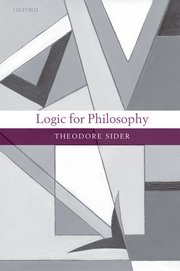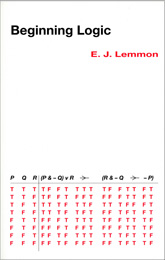Symbolic Logic
General Information
Course OVERVIEW
COURSE DESCRIPTION
There are three goals that I want students to satisfy by taking this course. (1) Students will be expected to dust off and polish their basic logic chops. Students are expected to have a working knowledge of the propositional and predicate logics coming into this course. Hence, I will not teach basic, classical logic in this course. But I will assign work that helps students to brush up on what they are already expected to know. In order to satisfy this goal, students will work through the majority of Lemmon's Beginning Logic throughout the term. (2) I also want students to develop a deep understanding of many of the most important issues about logic. The hope is that, by the end of the term, we will have discussed at least the following topics on this front: the nature(s) and purpose(s) of symbolic logic, the relationship of logic to rationality, model-theoretic and proof-theoretic approaches to logic, and the notions of soundness and completeness. (3) The final goal is for students to gain a broader understanding of some non-classical logics. Here, we will discuss some subset of the following systems as well as their philosophical applications: basic modal logic, deontic logic, epistemic logic, many-valued logic, fuzzy logic, intuitionist logic, and relevance logic.
COURSE OBJECTIVES
By the end of this course and successful completion of all course requirements, the student will at least be able to do all of the following:
- proficiently use the tools and concepts of first-order logic in order to prove / solve advanced theorems / problems in propositional and predicate logic,
- explain the motivation for using formal languages to do logic, and distinguish model-theoretic / semantic and proof-theoretic approaches to formal logic,
- compare the notions of soundness and completeness, and summarize soundness proofs for first-order logic,
- compare and contrast various non-classical logics, and summarize various philosophical motivations and applications for these logics.
COURSE PREREQUISITES
I will assume that you all have a working knowledge of deductive logic up through predicate logic (If you’ve taken PHIL 3200 and remember what you learned in that course, then you’re fine). If you aren’t in this position, don’t take this course. You will fall behind, and you almost certainly will not enjoy the class!
Course Materials
REQUIRED TEXTBOOKS
Theodore Sider,Logic for Philosophy (Oxford, 2010).
- This is our primary textbook for the course. This book gives a very nice introduction to advanced issues about deductive logic — e.g., metalogic, proof theory, model theory, philosophical applications of logic, non-classical logics, etc.
- Should be available at the University Campus Store.
- Online: [Oxford] [Amazon] [Barnes & Noble]
E. J. Lemmon, Beginning Logic (Hackett, 1978).
|
 |
|

|
OTHER RESOURCES
Course Homepage: http://philosophy.utah.edu/~jonahs/courses/6200/S12/index.html
In addition to this site, I will be using CANVAS in order to make other readings available to you all, to keep you updated on your grades, for course communication, and also for our course calendar.
COURSE Requirements
ATTENDANCE / PARTICIPATION
(10% of final grade for PHIL 5200)
Attendance is required in this course. By not coming to class, students will be hurting their own final course grades in several ways. First, I won't take attendance, but I will keep track of who is in class and actively, regularly participating. At the end of the course, I will give each (undergraduate) student a percentage grade that will be worth 10% of his or her final course grade. Second, less directly, students who miss classes will thereby miss important course content; as a consequence, students who miss class will not do as well on tests, homework, or in class discussion.
HOMEWORK
(40% of final grade)
Periodic homework assignments will be posted on the course schedule. Homeworks for each week are due on the Friday of that week by 4pm -- students should deliver them to my mailbox in CTIHB 402F. After the due date, I will post solutions on CANVAS so students can check their work (unless the solutions are already given in the text). I will not accept any late homework, and I will not drop any scores at the end of the semester, so make sure that you finish all of your assignments and get them handed in on time. Your overall homework grade at the end of the term will be calculated as a straight average of all of your homework grades throughout the term.
EXAMS
(2 x 25% = 50% of final grade)
Students will take a midterm and final exam. The final will be cumulative. I will announce the format of the exams later in the term. In general, I do not allow students to make up missed exams. Some exceptions might be made in cases where students have a valid reason excusing them and evidence of that reason (e.g., sickness and a doctor’s note).
PRESENTATION (graduate student requirement only)
(10% of final grade for PHIL 6200)
Graduate students enrolled in this course will be responsible for leading an in-class presentation over some assigned reading. The expectation will be that you take a portion of the assigned reading (from Sider) and lead our class discussion on that part of the reading.
Grading
Final letter grades will follow a standard 10-point scale: 98-100 A+, 92-98 A, 90-92 A-, 88-90 B+, 82-88 B, 80-82 B-, etc. I will not be using a curve when calculating your grades.
Policies, etc.
MISSING AND LATE ASSIGNMENTS
In general, I do not allow students to make up missing homework or missed exams. I also generally don't allow students to turn in late work. Some exceptions might be made in cases where students have a valid reason excusing them and evidence of that reason (e.g., sickness and a doctor’s note).
CELL PHONES, TABLETS, COMPUTERS, ETC.
Please turn off your electronic devices during class. This very much includes your cell phones! If you absolutely feel like you have to have your tablet or laptop with you to take notes during class, please talk to me outside of class to argue your case.
ACADEMIC INTEGRITY
All students are expected to adhere to the standards of academic honesty. Any student engaged in cheating, plagiarism, or other acts of academic dishonesty, would be subject to disciplinary action. Students should refer to the University of Utah Student Code for a description of academically dishonest behavior and a summary of the disciplinary actions that the University will take in punishing students who do not adhere to the standards described therein.
ADA STATEMENT
The University of Utah seeks to provide equal access to its programs, services and activities for people with disabilities. If you will need accommodations in the class, reasonable prior notice needs to be given to the Center for Disability Services, 162 Olpin Union Building, 581-5020 (V/TDD). CDS will work with you and the instructor to make arrangements for accommodations. All information in this course can be made available in alternative format with prior notification to the Center for Disability Services.
GENERAL EDUCATION STATEMENT
This course contributes to the University of Utah's Quantitative Reasoning and Quantitative Intensive requirements. For such courses, academic units must identify three essential learning outcomes (ELOs) that are relevant to university general education objectives. The ELOs for this course are: Inquiry and Analysis, Quantitative Literacy, and Foundations and Skills for Lifelong Learning.

